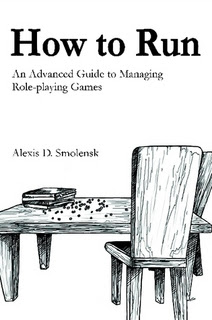"Fun cannot be planned. It can only be allowed."
Alexis Smolensk, How To Run.
Readers of this blog will probably notice that I make frequent reference to someone named Alexis, whose blog; Tao of D&D has certainly inspired and influenced my sensibilities as a DM.
Alexis Smolensk is an earnest proponent of the notion that D&D (and by extension, traditional RPGs) can actually be good if only the participants are willing to put care, effort and energy into the pursuit.
To this end, he wrote a book called How to Run: an Advanced Guide to Managing Role-playing Games
This work is available at lulu. I recently got around to buying and reading it for myself.
This work can not be judged by its minimal cover. The extremely uncomfortable-looking chair and the table notably devoid of players seem barren and forbidding. Yet perhaps this image is an intentional distillation of the book's main message: Dungeon Mastering done properly requires rigorous effort, most of which is done when the players are not around. The back cover seems to extend this metaphor.
I have to rank this book highly because there is simply no comparable work out there.
While there is plenty of good advice on Alexis' Blog, he has definitely held back some pearls of wisdom for this book. So don't think one is a substitute for the other.
Official rulebooks tend to have very scant advice on how to actually Run Game. Knowing the rules is not the same as knowing how to apply them. Rarely is there practical advice for designing or preparing a game. Advice for dealing with players is shallow at best.
How to Run fills this void.
While the advice could be applied to any traditional RPG, or even game design in general, Alexis frames his arguments in terms of D&D, and he proudly uses the term Dungeon Master as opposed to any softer or more generic terms for the same thing.
How to Run is divided into four parts:
The first offers general advice which seems to be intended as a sort of First Aid to correct faltering DMs, and give readers an idea of the player-DM dynamic Alexis is going for: one which emphasizes impartiality and player agency.
The second part focuses on managing one's self as a DM; with a focus on self control, dealing with stress and learning how to not give too much away,
The third part is concerned with handling players, working from the philosophy that the DM is providing a sort of service to the players, and not the other way around.
The fourth part deals with design and planning of the game and world.
There are 15 chapters in all. Each ends with a bulleted summary which ties the information up neatly.
I do have one gripe with this work: At times, the advice given is very general and abstract, and I find it difficult to concretely apply. There is certainly a good deal of easily applicable advice. But in some cases, a few more examples or anecdotes would not have gone amiss.
One reason for this occasional generality might lay in the Bibliography, which makes no reference to any D&D sourcebook or even works on game-design. It isn't Appendix N by a long shot. Rather, it includes titles such as:
Conceptual Models: Core to Good Designs
Consumer Behavior and Algorithm Design
Situational Awareness for Emergency Response
The toxic triangle: Destructive leaders, susceptible followers, and conducive environments
Alexis has taken his own advice and read broadly; applying outside knowledge to the development of a Good game. This synthesis from wider, real-world sources probably accounts for the confusing abstractions which pop up in How to Run.
This does little to reduce the value of Alexis' unprecedented and insightful work.
Personally, I got a lot out of How to Run.
But should you buy a copy? I don't know. How much do you care about your quality as a Dungeon Master?
Are you willing to pay 20-some dollars and read 300-odd pages of text without pictures or charts? Is it worth the effort to improve your game? If you think not, this may explain a few things about the games you run.
****/*****
